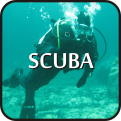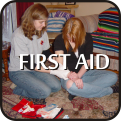Diver Safety Courses
We also teach a variety of Dive Safety Courses, become a safer diver and help others in need!
Divers Alert Network Courses
|
Oxygen First Aid for Scuba Diving Injuries As a recreational diver, you can receive training to provide vital first aid that can make a difference to a scuba diver with decompression illness. The DAN Oxygen Provider Course provides entry-level training in the recognition and management of possible diving-related injuries using emergency oxygen first aid. |
Oxygen First Aid for Aquatic EmergenciesThis course trains non-divers and professional rescuers (such as lifeguards) to recognize near-drowning / submersion incidents and other aquatic medical emergencies and to provide basic life support including the use of oxygen first aid. |
|
Advanced Oxygen First Aid for Scuba Diving InjuriesThis advanced-level program is designed to train existing DAN Oxygen Providers to use the MTV-100 or a Bag Valve Mask while providing care for a non-breathing injured diver. |
|
First Aid for Hazardous Marine Life Injuries
|
|
Automated External Defibrillators for Scuba DivingMore than 10 percent of all dive fatalities are actually caused by cardiovascular disease, according to DAN dive accident and fatality statistics. This course teaches divers and other interested parties to provide care for sudden cardiac arrest including the use of an automated external defibrillator (AEDs). |
|
Automated External Defibrillators for Aquatic EmergenciesWhen a person drowns, they may or may not inhale water. They normally enter cardiac arrest because of the inability to breathe. This course teaches interested parties to provide care for cardiac arrest by using an automated external defibrillator (AED). |


